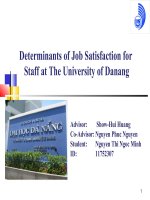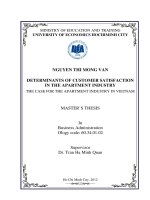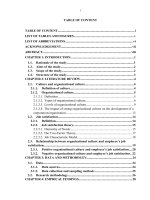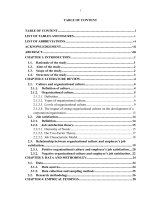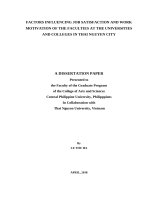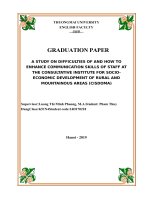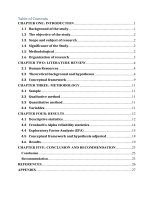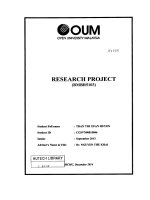Determinants of Job Satisfaction for Staff at The University of Danang
Bạn đang xem bản rút gọn của tài liệu. Xem và tải ngay bản đầy đủ của tài liệu tại đây (655.85 KB, 20 trang )
1
Advisor: Show-Hui Huang
Co-Advisor: Nguyen Phuc Nguyen
Student: Nguyen Thi Ngoc Minh
ID: 11752307
Determinants of Job Satisfaction for
Staff at The University of Danang
CONTENTS
2
3
1. Background
INTRODUCTION
Ministry of Education and Training
The University of Danang
Scientific and Training Council
Board of Directors
Offices and Functional
Departments
The Colleges, Universities, Campus
of UD in Kon Tum and Faculty of
Medicine and Pharmacy
Training and
Research Centers
The English
Language
Institute
INTRODUCTION
Offices and Functional Departments
The Administration Department
The Personnel Department
The Planning and Finance Department
The Equipment Management Department
The Academic Affair Training
The Postgraduate Studies Department
The Educational Quality Assurance Department
4
INTRODUCTION
Offices and Functional Departments (cont)
The Inspection and Competition Legislation Department
The Students Affair Department
The Science Technology and Environment Department
The International Cooperation Department
The Construction Project Management Department
Centers of Software Development, Information Resources,
Continuous Education
The English Language Institute
5
INTRODUCTION
2. Statement of the Problem
Importance of job satisfaction
Importance of job satisfaction at The University of Danang
Any problem related to motivation & job satisfaction at the
University of Danang
The University of Danang is developing and seeking a foothold
in the Central and Western Highlands.
To promote the development of the organization.
6
INTRODUCTION
2. Statement of the Problem (cont’d)
Need to get some research data for the director of UD to
improve job satisfaction at the UD in the future.
Create employee engagement for organizations
Be the foundation for the organization to increase staff’s
loyalty for the University of Danang
That’s the reason why research of staff’ s job satisfaction is
worth of studying.
7
INTRODUCTION
3. Research Purpose
Discussion major theories about work motivation
Identify variable that may affect staffs’ job satisfaction
Knowing what are the needs for the civil servants to enhance
staff’s job satisfaction
Provide recommendations to the Board of Management to
improve staff’s job satisfaction
8
LITERATURE REVIEW
Definition of Motivation
High motivation causes high job satisfaction whereas low motivation
leads to low job satisfaction (Mehmet D. Karslıa & Hale skenderb,
2009)
Motivation is the set of processes that arouse, direct, and maintain
human behaviour towards attaining some goal (Greenberg & Baron,
2003)
Motivation is a term used to refer to the efforts both inside and
outside of a human effect arouse enthusiasm and persistence to
pursue a way of action identified (Nguyen & Nguyen, 2007).
9
LITERATURE REVIEW
10
Self-
actualization
Esteem
Affiliation
Security
Physiological
Figure 1: Maslow's hierarchy of needs (1943)
11
Frustration–Regression
Satisfaction–Progression
Growth needs
Relatedness needs
Existence needs
LITERATURE REVIEW
Figure 2 ERG Model of Motivation (Alderfer, 1969)
According to Aldefer (1969), people have three basic needs:
LITERATURE REVIEW
12
Figure 3: Herzberg’s Two-Factor Theory (1968)
LITERATURE REVIEW
Herzberg’s theory based on Maslow's hierarchy of needs.
However, in Herzberg’s theory there is a close combination
between satisfaction and dissatisfaction (Hellrigrl, Jackson,
Slcum, 2005) .
Herzberg’s motivations also includes self-actualization, esteem
and affiliation of Maslow’s hierarchy of needs.
Herzberg’s hygiene factors also includes security and
physiological in Maslow’s hierarchy of needs.
13
RESEARCH METHODOLOGY
1. Research Model
14
Demographic features
Gender
Age
Seniority
Work Category
Salary
Motivators
Hygiene Factors
Achievement
Recognition
Responsibility
Work itself
Personal growth
Working condition
Pay and security
Company policy
Supervisors
Interpersonal relationship
Job Satisfaction
RESEARCH METHODOLOGY
2. Data Analysis
Using SPSS version 16.0 for data
analysis
Calculating Cronbach’s α for
questionnaire reliability
Using Multiple Regression analysis
and Pearson Correlation to analyze
the relationships between variables
15
RESEARCH METHODOLOGY
2. Quantitative method
Using questionnaire survey
Likert measure (5 point scale)
Target population:
The number of staffs at Offices and Functional, Centers and
Institute of the University of Danang: 300 people
Random sampling: the staff is divided into 4 groups according
to their work characteristics. About 30 to 40 staff are randomly
selected from each group.
16
SIGNIFICANCE OF RESEARCH
Identify factors that affect employee satisfaction
Provide recommendations to the directors of UD for
motivating staffs’ job satisfaction
Provide recommendations to the directors of UD to
promote working efficiency.
17
STRUCTURE OF THESIS
Chapter I. Introduction: Background, Statement of the
Problem, Research Methodology
Chapter II. Literature Reviews: Definition, Theories.
Chapter III. Research Methodology: Definition, Research
Model.
Chapter IV. Data Analysis and Result
Chapter V. Conclusions and Recommendations
18
REFERENCES
Agenda, Customer service module 2, The internal customer, LC Notebook Tab II. Customer Service
Steven H. Appelbaum, et al, 2005, A case study analysis of the impact of Satisfaction and Organizational
Citizenship on Productivity .
Kathleen A. Lane RN et al, 2010, A study of nurse factulty job satisfaction in community colleges in Florida,
Teaching anh Learning in Nursing.
Chuck Willian,
Frederick Herzberg, “One More Time: How Do You Motivate Employees?”
Harvard Business Review, January–February 1968.
Nguyen, Diem, 2004, Scientific Information, An Giang University
Le, Statistics Publisher, 2007, Administrators.
Shawn K.Yearta et al, 1995, Journal of Occupational and Organizational Psychology.
Iskenderb, H. & Karslı, M. D., 2009, To Examine the effect of the motivation provided by the administration
on the job satisfaction of teachers and their institutional commitment, Procedia Social and Behavioral
Sciences , 2252-2257.
/> />19
20
